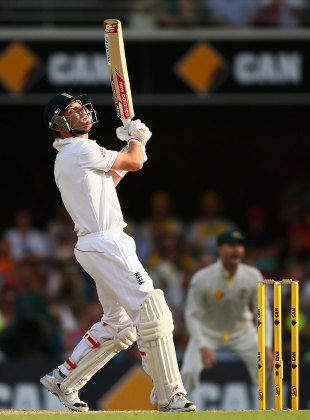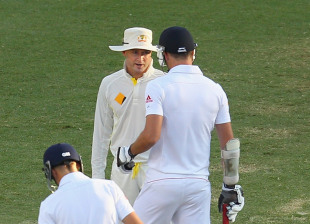| 
| It's a time for Jonathan Trott to seek clarity © Getty Images |
| Enlarge
|
|
|
|
I admire the quote from Mark Twain where he said, "The two most important days in your life are the day you were born and the day you find out why."
It's a deep, thought-provoking observation. Why are we here and who are we?
The more fortunate ones have an inbuilt belief as to why they exist. They flow through life. Then there are the masses who ebb and flow, searching and evolving. There are also many who discover that for much of their lives they are unsure. Then one day they realise that, in fact, who they are is masked. They reach the point when enough frustration is enough. Only at that point does the real truth surface; the mask must be removed.
Jonathan Trott has reached a point. This is the point or the day he will find out why he was born, what his life is truly about. When I heard the news I felt I knew where he was in his mind. I have been in similar territory too. Many times.
If you are to choose one word to describe what he is feeling it is "confusion". Confusion is the opposite of clarity. The mind, and thoughts that come thick and fast at you, are muddled, twisted and distorted. You search for clues as to how to go forward at any moment, and as you decipher it all, you can become untrusting, unsure, and uncertain as to the clues you find. The higher the expectation of life, the harder it is to work out. Confusion is a killer.
Where does the core of this confusion grow? My feeling is that it grows in the first decade or so of your life. Then it becomes cemented between the ages of 15 to 20. From there you learn ways to wear the mask. As your body and mind reach maturity you realise the mask is necessary. The higher you expose your confusion, the more the mask becomes permanent.
My mask was firmly in position by the age of 22. I had tasted Test cricket for two years, played 13 Tests, averaging 21. I was supposed to be one of the best young players in the world. Expectations were high and I wasn't meeting them. I cried a lot, moods ebbed and flowed, emotions ran hot. My dream as a boy of scoring a hundred at Lord's was fading fast.
Then I found a mask, and I began to fake it until I made it. Part of the mask was to copy great players to hide my own inadequacies. The other part was: I was created from a fast-tracking system and had no emotional stability, so I had to make up time fast. As time went by I completely lost touch with that warm-hearted kid from Titirangi. Instead I became an aloof, intense, moody son of a bitch from New Zealand. Darth Vader, playing top-level cricket.
I made it, just. I scored the hundred at Lord's, I notched up hundreds around the world as my dream world wanted me to. I loved batting. But I grew to hate myself and the mask I wore. Off the field I was totally lost. As the expectations of a nation climbed, I knew the mask was not going anywhere. It had to stay on until the job was done.
| | | | |
| |
| England need to see Australia for who they are as a team and a nation right now: fully masked and in stage mode, well prepared and united |
| |
| | |
|
Then the body started to bend and break. The feet stopped moving smoothly. The failures arrived. In my last seven Tests I averaged 19. I broke down completely and retired depressed. To get back up on my feet the mask remained on, for television. Last year, when cancer knocked loudly, I had no choice anymore but to face the truth and start again. I unmasked in public and I surrendered to help. It was the only way.
Today, while some confusion exists, the mask has gone and I am happy to look at the real me for the first time in a long time. I accept who I am. When folks ask me what the meaning of success is, I reply that it's accepting who you are.
At this difficult moment in his life, Jonathan Trott is a very important story. It is about the courage and honesty that are driving his desire to remove the confusion and frustration and find his true fulfilment. And he will, slowly, he will. He has shown his resilience at certain points as a batsman, and he will do so again as he identifies that beyond the often boring expectations of being an international sportsman, he is an authentic, loving man.
On the other side of the pitch, wearing another mask, is David Warner. His recent behaviour of lashing out at people tells the story of a man also confused and frustrated, despite his talent. And he continues to lash out, with bat and mouth. That he wears the macho bravado mask, the loud arrogance that is more ego-driven, there is no doubt. His batting has hit a golden run and it's actually pleasant to watch. It's what he is good at. Yet his story has only just begun. Hopefully he will see that life isn't about beating up others but about accepting who you are. I'm sure deep down in Warner there is a genuine spirit.
Which makes me consider the Ashes. While one or two masks are being shed, there is no doubt that the gloves are off for Australia. Failure has forced them to secure the mask once and for all until the last ball is bowled; no drinks with the opposition, no warmth shared, and only a minimum respect. Australia have donned battle garb, to mask their frailties, and it has surprisingly caught England off guard.
Alas, it is not real. If we are honest, it's just a façade. It's not really Michael Clarke's true self, or Darren Lehmann's. Clarke, up until five minutes to go in the Brisbane Test, displayed a real face and spirit to the challenge in front of him. Then, on the stroke of the kill, his face changed and the mask was there for all to see, ugly and not authentic.
| 
| James Anderson would be better off focusing on hitting the top of off stump © Getty Images |
| Enlarge
|
|
|
The finger-pointing rant was a performance to lead into the next battle in Adelaide. He did not need to act the way he did. That he did is indeed the Australian way, given they have been humiliated so much recently and had smelled blood. At this point, for such a proud cricketing nation, failure is not an option.
It's all put on to frighten away the demons of the last three series. That is what the Ashes has become, a gladiator sport, fuelled by drama and controversy. As cricket entertainment goes, it's riveting and compelling. After it is done, they will all go home, try and take off the false ego, and try and be human again, especially in front of family and friends. The lucky ones will take the masks off easily, knowing they are fake, while for those who conceal it, confusion will continue to hit bumps in the road.
England need to see Australia for who they are as a team and a nation right now; fully masked and in stage mode, well prepared and united. Even sections of the media are on show, as the Broad ban showed. Nevertheless, if England see through the acting and ignore it, and instead focus on the energy, and on being true to themselves, then they can and will compete closely.
If Jimmy Anderson can pull his head in and concentrate on late swing, he will be doing his job for his country. He is not getting better as his body slows down, especially while acting a clown, so his efforts should be on hitting the top of off stump. Additionally KP and Prior could do with simply playing straight as a button for a while.
Whether they are good enough across the park right now in these "rather hot" foreign conditions, is another matter. What they must insist upon and lay down as their true intent is that they will not be fooled into noticing the act. Cook is the perfect man to lead this honest endeavour. He is truly grounded and real, with the fortitude to grind down the macho manoeuvring.




